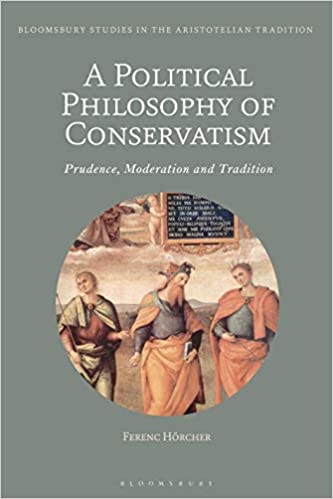A Political Philosophy of Conservatism

A Political Philosophy of Conservatism: Prudence, Moderation and Tradition. Ferenc Hörcher. New York: Bloomsbury Academic, 2020.
A Political Philosophy of Conservatism focuses on the fourth cardinal virtue, prudence, which origins resides in the writings of Plato and Aristotle and continues in the works of contemporary thinkers. Influenced by John Dunn, Hörcher explores the specific historical thoughts and actions of participants in a particular historical political situation where basic universal values are illuminated. In other words, Hörcher wants to examine prudence in a specific historical context, as the virtue itself demands, for prudence can only be studied concretely.
In the first part of the book, Hörcher outlines a political philosophy of conservatism based on prudence from specific cases while, at the same time, employs a concept of prudence that fundamentally is unchanged but manifested differently dependent upon the particular regime and its political climate. He summarizes the views of prudence by looking at classical authors who held different but connected views of the role of prudence in political thought. Understandably, Aristotle plays an important, if not the key, role in this account and is closely linked to Cicero, Augustine, and Aquinas. As a political actor, Cicero had tremendous influence on the medieval and early modern political discourse about prudence as a politician. Augustine also had a powerful influence on medieval political discourse about prudence but from the perspective of religious contemplation after he had left public life as rhetorician. Aquinas represents an alternative tradition of the theoretician who lives apart from politics that we found in either Cicero or Augustine’s earlier life.
The Roman legacy was continued in the Italian Renaissance with its circle of humanists who both wrote and practiced prudence. According to Hörcher, Machiavelli is a useful figure as a bridge between the ancient and early modern worlds where he tried to keep the traditional value structure of the cardinal virtues alive in a new political world that disregarded them as necessary for political success. This historical account finishes with the late twentieth-century authors, such as Bernard Williams and Raymond Geuss whose political realism is a new way to critique the liberalism of John Rawls and Ronald Dworkin. Although there are significant differences between Williams and Geuss, both believe constitutional democracy required both a practical and theoretical defense.
In the second part, Hörcher draws upon his rich historical interpretation of prudence to provide a concept of prudence that is connected to conservative politics. Here Hörcher offers an analytical investigation of the concept as the key to understanding conservatism. This analysis takes an account of the constraints that hinder humans to speak and act in politics in a practically rational manner. These constraints are agency, temporal, and knowledge.
First, agency-constraints are to see whether politics as an activity of cooperation or conflicting interests, either within a community or among communities. Hörcher adopts the Catholic conception of the person to address the issue of sociability – the inclination to cooperate with others – as the key to resolve this issue. Second, time-constraints are to acknowledge the temporal stipulations of human existence. We see time as past, present, and future. Prudence – to use Josef Pieper’s phrase, “the reality principle” – is concerned with the present moment. But in order to do so, it must take into account the past as well as the future. Finally, the third constraints are knowledge: how people are informed by the issues of politics. The barriers to reliable information are perspective distortion, situational mutability, and value dependence. Practical knowledge – such as Polanyi’s personal knowledge, Hayek’s spontaneous order, and Oakeshott’s practical knowledge – offers a way to practice prudence by overcoming these constraints.
The book next summarizes resources that can be moved into politics to prepare practically wise decision and action. First it looks at the individuals’ own personal resources followed by communal resources. For individual resources, there are the Aristotelian tradition of virtue and character. Another resource can be found in the Italian Renaissance humanists’ moderation (balance, civility, decorum) which are taken from the Aristotelian and Ciceronian traditions. Self-restraint can lead the art of compromise, which belongs to the conservative tradition. Finally, communal resources are required: institutional order’s norms which aligns individual and group interest in an explicit and formalized way (rule of law). However, unwritten customs and traditions (the spirit of the laws) which is in constant flux and difficult to ascertain are also needed to be kept prudence alive.
The last chapter answers the simple question of how to act properly in politics with its distinction between a perfect and proper act. The former is impossible to achieve, the latter is. A proper act in the Aristotelian-Ciceronian tradition is connected to decorum, prudence, and political realism. To find the proper act in politics is to see and understand past examples, to confront the moment at hand, and to have a strategy for how to proceed in the future. This is done by the political philosophy of conservatism, as determined by the concepts of prudence, moderation, and tradition.
Adopting a moderate and balance perspective, A Political Philosophy of Conservatism provides a theoretical, historical, and practical account of how to understand and practice prudence. It is a critical book for the West to recapture a sense of realism and proportionality in its politics today. Hörcher has done us a tremendous service in showing us a way forward from our polarized public discourse by highlighting the value and virtue of prudence.




